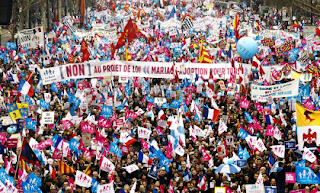A cartoon in Le Parisien lampooned the scaremongering, showing a boy asking his father to tell him a scary bedtime story. The father replies: "The government plans to make mothers have abortions and put the fetus in the womb of another woman who will sell it to a homosexual couple who will decide whether to bring it up a girl or a boy."
This cartoon best describes the reason why there is an unprecedented protest in France regularly to prevent the promotion of 'Unnatural Family' among children.
Using their signature pink and blue flags, the Manif Pour Tous (Demo for all) movement is growing each day and they are attracting more and more attention from the silent majority.
"If we don't stop this government there be no future for France," said Médéric, 20, a student. "The family is at risk. France is at risk. You wait, it'll be euthanasia next."
Last February 2014, protesters – 80,000 police said, 500,000 claimed the organisers –took to the boulevards of Paris and Lyon in a show of force against the French government and in support of "the family” or “traditional family” composed of a father, mother and if possible children.
The protesters were united against gay marriage and adoption first. They lost that battle last April 2013 when parliament approved same-sex marriage. Since then, they have continued their opposition but moved on to "the family", which they believe is threatened by a proposed family law expected in the spring.
Recent demonstrations, however, are a vocal and visible expression of a more febrile atmosphere spreading across France, where the popularity of the Socialist president, François Hollande, is at rock bottom, the mainstream centre-right opposition has no clear leadership, and the far-right Front National is forecast to make significant gains in local and European elections.
The widespread sense of dissatisfaction and disillusion has encouraged more protest and push for a conservative policy in the coming months.
Hollande describes the movements as "repressive and regressive", while the interior minister, Manuel Valls, has likened the atmosphere to the economic, social and political crisis that brought violent "anti-politics" demonstrations to France in the 1930s.
If demonstrators spoke of despising the government, Valls made it clear the feeling was mutual. He told Le Journal du Dimanche that the country was witnessing the formation of a "Tea Party à la Française". Recent protests were, Valls declared, a "revolt that is anti-republicans."
Symbolic of the sense of collective hysteria was the row early this year over so-called gender theory, which protesters claimed was being taught at schools. Individuals with right-wing links were accused of spreading unfounded rumours that the government's ABCD of Equality programme, aimed at ending sexual stereotyping in schools, involved "masturbation classes". As a result, parents at 100 schools pulled their children from classes, convinced the government was meddling with their identity and sexual orientation.
This cartoon best describes the reason why there is an unprecedented protest in France regularly to prevent the promotion of 'Unnatural Family' among children.
Using their signature pink and blue flags, the Manif Pour Tous (Demo for all) movement is growing each day and they are attracting more and more attention from the silent majority.
"If we don't stop this government there be no future for France," said Médéric, 20, a student. "The family is at risk. France is at risk. You wait, it'll be euthanasia next."
Last February 2014, protesters – 80,000 police said, 500,000 claimed the organisers –took to the boulevards of Paris and Lyon in a show of force against the French government and in support of "the family” or “traditional family” composed of a father, mother and if possible children.
The protesters were united against gay marriage and adoption first. They lost that battle last April 2013 when parliament approved same-sex marriage. Since then, they have continued their opposition but moved on to "the family", which they believe is threatened by a proposed family law expected in the spring.
Recent demonstrations, however, are a vocal and visible expression of a more febrile atmosphere spreading across France, where the popularity of the Socialist president, François Hollande, is at rock bottom, the mainstream centre-right opposition has no clear leadership, and the far-right Front National is forecast to make significant gains in local and European elections.
The widespread sense of dissatisfaction and disillusion has encouraged more protest and push for a conservative policy in the coming months.
Hollande describes the movements as "repressive and regressive", while the interior minister, Manuel Valls, has likened the atmosphere to the economic, social and political crisis that brought violent "anti-politics" demonstrations to France in the 1930s.
If demonstrators spoke of despising the government, Valls made it clear the feeling was mutual. He told Le Journal du Dimanche that the country was witnessing the formation of a "Tea Party à la Française". Recent protests were, Valls declared, a "revolt that is anti-republicans."
Symbolic of the sense of collective hysteria was the row early this year over so-called gender theory, which protesters claimed was being taught at schools. Individuals with right-wing links were accused of spreading unfounded rumours that the government's ABCD of Equality programme, aimed at ending sexual stereotyping in schools, involved "masturbation classes". As a result, parents at 100 schools pulled their children from classes, convinced the government was meddling with their identity and sexual orientation.
